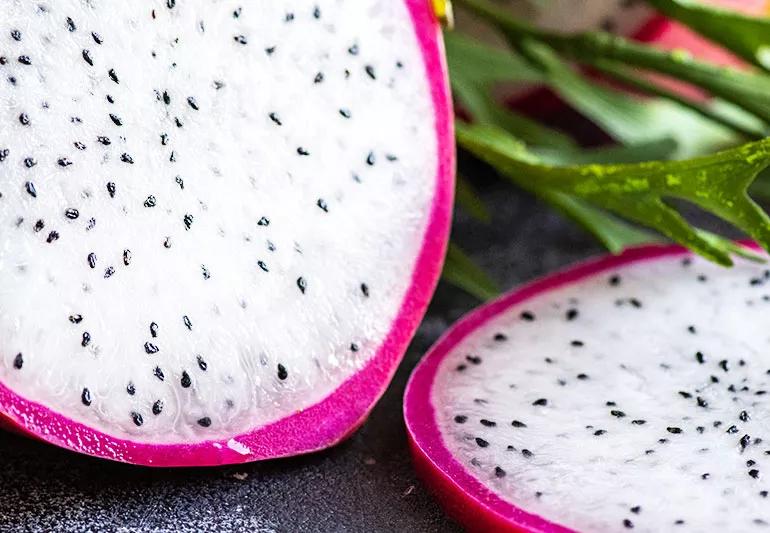The fanciful fruit is a good source of fiber and antioxidants

Food ruts happen. Maybe you’re in one now. Need help getting out of it?
Advertisement
Cleveland Clinic is a non-profit academic medical center. Advertising on our site helps support our mission. We do not endorse non-Cleveland Clinic products or services. Policy
Dragon fruit is a nutritious — not to mention vibrant — fruit that’s full of fiber and may improve your gut health.
Ready to get a little adventurous?
Registered dietitian Joyce Prescott, MS, RD, LD, explains the benefits of dragon fruit and how to incorporate the fruit into your diet.
Dragon fruit, also called pitaya or strawberry pear, looks like something straight out of a Dr. Seuss book: On the outside, it’s a pink oval with green scales (hence, the “dragon” name). Inside, it has white flesh with tiny black seeds. The fruit’s strange appearance also gives off “psychedelic artichoke” vibes.
“It’s a tropical fruit that comes from a cactus,” Prescott explains. “It’s available everywhere around the world, but it’s indigenous to Mexico and South America.”
Dragon fruit is in season from summer to early fall. It comes in a variety of shapes and colors:
Advertisement
“If you like kiwi fruit and pears, then you’ll probably like dragon fruit,” says Prescott. “It’s sweet and crunchy.”
Is dragon fruit healthy? According to the United States Department of Agriculture (USDA), a 1-cup serving of dragon fruit contains:
The flesh of the dragon fruit is low in calories and fat-free. Dragon fruit benefits also include the following:
Dragon fruit is an excellent source of fiber, Prescott says. The daily recommendation for fiber in adults is at least 25 grams — and dragon fruit packs 5.6 grams in a single 1-cup serving.
“Fiber may benefit gastrointestinal and cardiovascular health,” she adds. “Fiber is also filling, which is helpful if you’re trying to lose weight. People who eat whole, fiber-rich foods are more likely to maintain a healthy weight.”
Healthy bacteria in your gut may help digestion and even reduce colon cancer risk. Dragon fruit is a prebiotic that boosts the growth of probiotics lactobacilli and bifidobacteria.
“Some studies appear to show that dragon fruit promoted the growth of healthy gut bacteria,” says Prescott. “It may have a positive effect on the gut microbiome, the good bacteria in our intestines.”
Dragon fruit contains a few different kinds of antioxidants, which work to neutralize free radicals. Those free radicals can damage cells and cause inflammation, which can lead to chronic diseases like cardiovascular disease, diabetes and even cancer.
Vitamin C, an antioxidant, helps your body absorb iron and boosts immune system health. Carotenoids may reduce cancer risk. And lycopene, a type of carotenoid, may improve heart health and reduce cancer risk.
Because of its popularity over the last few years, you can typically find dragon fruit either in the produce department or the frozen food section of your local supermarket.
While dragon fruit is best eaten raw, you can also throw it on the grill like some other fruits. Enjoy it on its own or add it to:
“Overall, the health benefits of dragon fruit make it an ingredient worth exploring,” encourages Prescott. “So, have fun and shake up your breakfast, make a new snack or try out a fun dessert with it.”
Advertisement
Learn more about our editorial process.
Advertisement

The tropical fruit is a good source of antioxidants and vitamin C

High amounts of cholesterol and saturated fat in red meat may be linked to heart disease

The leaves and pods from this tree are rich in essential nutrients

This starchy root vegetable is a staple in many global cuisines — but it has to be prepared correctly, or it can cause serious concerns

These delicate green sprouts can give you an extra dose of vitamin K and other nutrients — but they’re not safe for everyone

Edamame, lentils and chicken breast are good sources of protein

Eating this root vegetable can help support your eye, heart and brain health

The flavorful herb is full of antioxidants that may help regulate blood sugar

The tropical fruit is a good source of antioxidants and vitamin C

Most people fall asleep within 10 to 20 minutes, but if your experience is different, adjusting your sleep schedule may help

Exploring your hidden side can lead to better understanding of what makes you tick